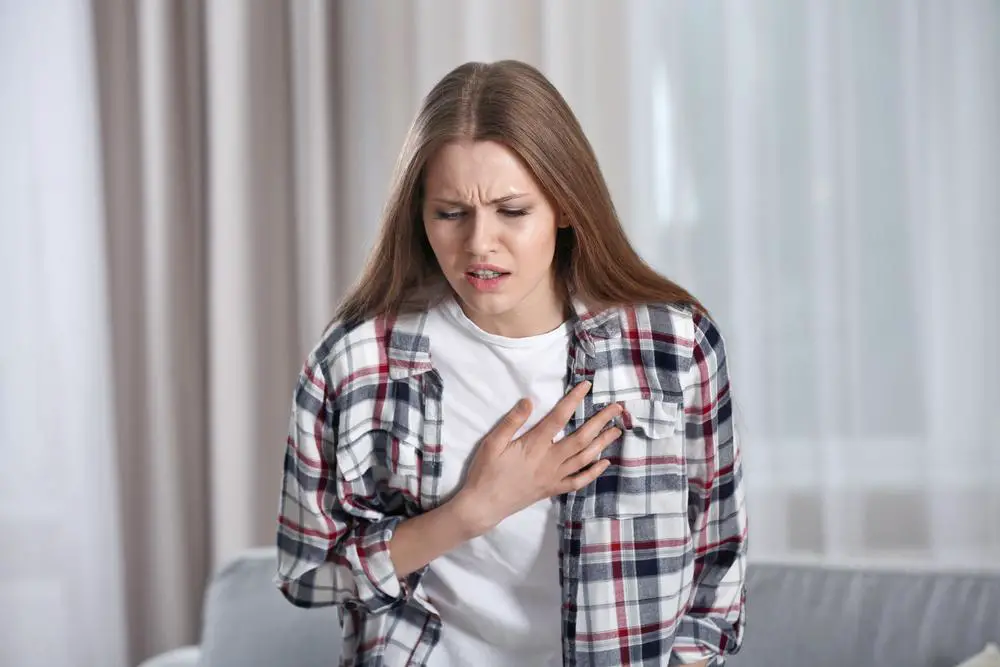As a BetterHelp affiliate, we receive compensation from BetterHelp if you purchase products or services through the links provided
Chest pain can be scary, and it’s even more nerve-wracking when it happens every day. Did you know that anxiety might be behind these daily aches? Our blog will guide you through the causes of anxiety-related chest pain and offer ways to find relief.
Keep reading for answers that could ease your mind—and your chest.
Understanding the Link: Anxiety and Chest Pain
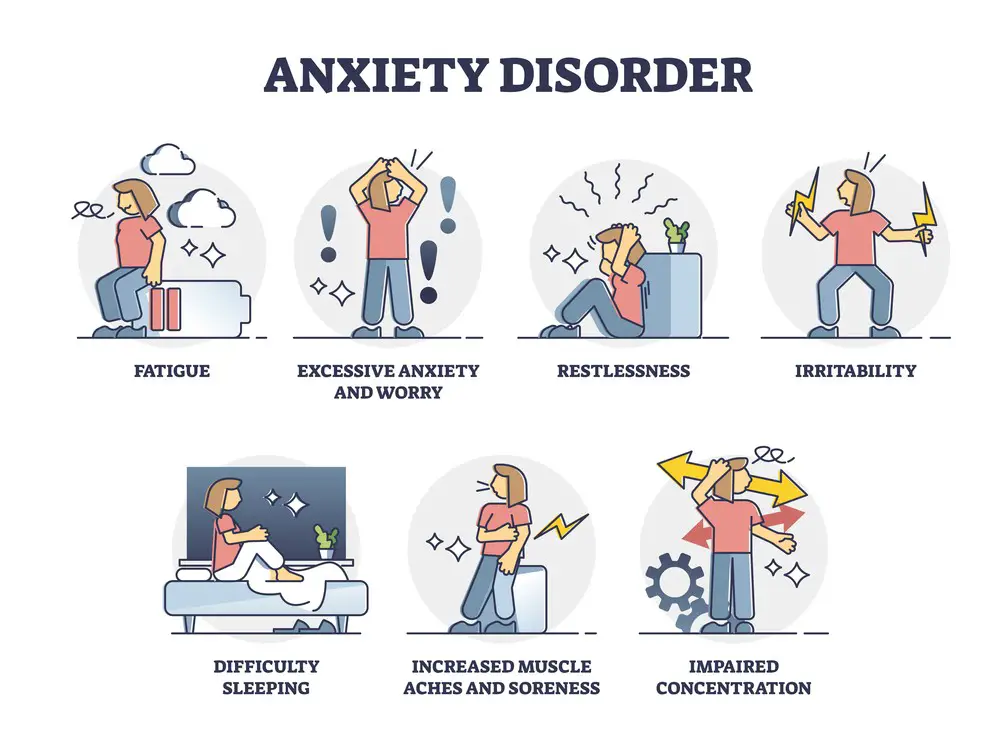 Many people often mistake anxiety-induced chest pain for a heart attack because the physical sensations can feel similar. This type of chest pain is typically caused by an adrenaline surge that affects the cardiovascular system, leading to changes in blood pressure and heart rate.
Many people often mistake anxiety-induced chest pain for a heart attack because the physical sensations can feel similar. This type of chest pain is typically caused by an adrenaline surge that affects the cardiovascular system, leading to changes in blood pressure and heart rate.
Stress hormones like adrenaline and cortisol tighten muscles, including those in your chest wall, leaving you feeling tightness or discomfort.
Anxiety can manifest in multiple physical symptoms, and a good percentage of cases involving chest pain are not related to cardiac issues. Instead, they may stem from musculoskeletal problems or hyperventilation during panic attacks that cause a sense of constriction around the heart area.
Recognizing this link helps differentiate between non-cardiac chest pain due to anxiety and potentially more serious conditions like heart disease. Understanding these distinctions is crucial for seeking appropriate treatment and managing daily life with less fear when such pains occur.
Common Causes: Exploring Anxiety-Related Chest Pain
Understanding the intricacies of our body’s response to stress is crucial; let’s delve into the web where anxiety tangles with chest pain, a familiar yet often misunderstood phenomenon.
It’s time to unravel how our mental state can manifest physically and what factors contribute to this unsettling synergy.
Can Anxiety Cause Chest Pain?
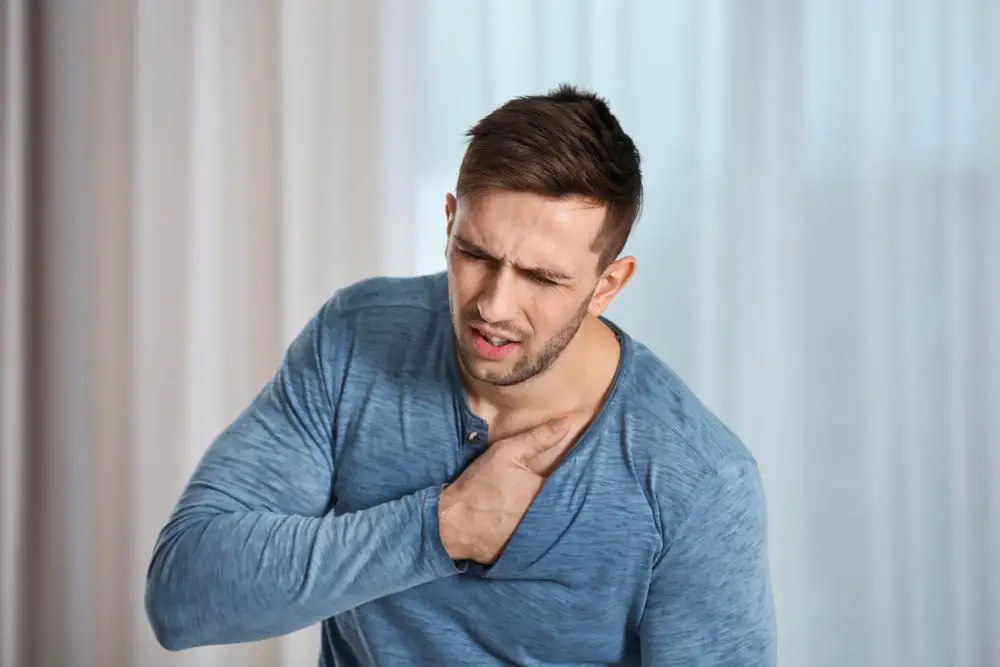 Yes, anxiety can indeed cause chest pain. This discomfort often mimics cardiac symptoms, leading many to fear they’re having a heart attack. However, most anxiety-related chest pains are non-cardiac.
Yes, anxiety can indeed cause chest pain. This discomfort often mimics cardiac symptoms, leading many to fear they’re having a heart attack. However, most anxiety-related chest pains are non-cardiac.
When stress hormones like adrenaline and cortisol surge during an anxiety or panic attack, they can cause changes in your body that lead to chest tightness or discomfort. The experience of this pain varies; some people report a sharp stabbing sensation, while others describe a dull ache.
Panic attacks frequently bring on bouts of intense chest pain alongside other distressing symptoms such as heart palpitations and hyperventilation. These episodes of chest discomfort can feel very threatening and may occur daily for those with conditions like panic disorder or chronic anxiety.
It’s essential to differentiate between musculoskeletal pain caused by anxiety and actual cardiac events because the treatment for each is quite different.
Despite the frightening sensations, understanding that these pains are typically not indicative of a heart attack can ease concerns as one seeks appropriate relief methods for managing this type of anxiety-induced physical symptom.
How Does Anxiety Cause Chest Pain?
Anxiety triggers a flood of stress hormones like adrenaline and cortisol in your body. These chemicals prepare you for “fight or flight” by making your heart beat faster and raising your blood pressure, which can lead to chest pain or discomfort.
Imagine these hormones as an alarm system that sets off various physical reactions; one is tightening the muscles in your chest area. This tension creates a sensation of chest tightness or pain.
During a panic attack, people often experience rapid breathing or hyperventilation—breathing in too much oxygen and expelling too much carbon dioxide. Your blood vessels constrict due to this imbalance, which can cause a sharp pain in the chest that might feel similar to heart palpitations.
Additionally, anxiety can spark gastrointestinal issues like acid reflux, another source of non-cardiac chest pain often mistaken for cardiac symptoms.
Seeking Relief: Effective Strategies for Everyday Chest Pain
For those living with frequent chest discomfort, the pain can be debilitating. While medical guidance is critical, implementing natural relief strategies helps sufferers better manage between flare-ups. Through lifestyle changes that address underlying causes, reduction in chest pain is possible without reliance on medication.
Identify and Modify Potential Lifestyle Triggers
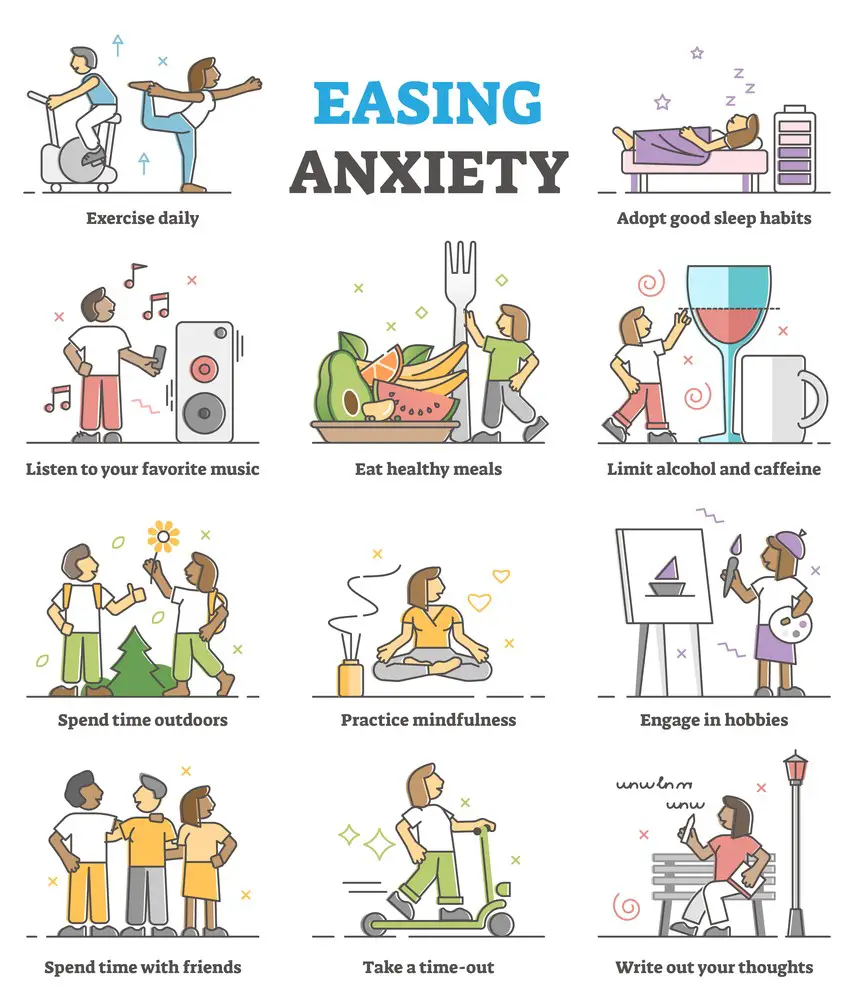 Common culprits like high stress, poor posture, inflammation-causing foods, or lack of physical activity can sustain pain. Keep a journal detailing diet, stressors, sleep, and symptoms to determine personal triggers. Making targeted adjustments can provide tangible relief.
Common culprits like high stress, poor posture, inflammation-causing foods, or lack of physical activity can sustain pain. Keep a journal detailing diet, stressors, sleep, and symptoms to determine personal triggers. Making targeted adjustments can provide tangible relief.
Engage in Regular Light Movement
Low-impact activities like walking, yoga, swimming, and stretching increase circulation, reduce tightness from anxiety and muscle tension and boost endorphins. However, check with your physician before starting new regimens.
Address Mental Health Factors
Chronic stress and anxiety both catalyze and exacerbate chest pain episodes via tense muscles, shallow breathing, and stimulation of nerves. Learning cognitive and body-based relaxation techniques gives sufferers valuable tools to short-circuit pain.
Optimize Sleep Quality and Consistency
Fatigue lowers pain tolerance while disrupting neurotransmitters. Prioritizing 7-9 hours nightly, limiting electronic use at night, and adopting Sleep-promoting rituals improves Both mental and physiological preparedness for pain management.
Communicate with your healthcare provider about holistic pain relief options like acupuncture, massage, or herbal supplements In tandem with medical care as needed.
Lifestyle Adjustments: Managing Anxiety-Induced Chest Pain
For those struggling with recurring chest discomfort triggered by stress, targeted lifestyle changes can provide lasting relief without medication.
- Establish a consistent sleep routine, allowing for 7-9 hours nightly, as fatigue exacerbates anxiety.
- Limit evening stimulation from screens, excessive lights, or heavy meals that disrupt sleep.
- Incorporate movements like yoga or walking, alleviating stiffness from anxious muscle tension. Regular activity reduces stress hormones that drive flares.
- Avoid unnecessary nervous system stimulants such as excessive caffeine, nicotine, or media overconsumption.
- Engage in relaxing hobbies like light reading, crafting, or spending time in nature.
Making sustainable adjustments to sleep, activity levels and unhealthy stimuli lays the foundation to minimize anxiety and subsequent chest pain without reliance on drugs.
The Role of Breathing Techniques: Alleviating Daily Chest Pain
For those suffering from recurring chest discomfort, breathwork can provide relief without medication. These techniques are easy and quick and work by activating the body’s natural relaxation response.
Firstly, try square breathing. Inhale for four counts, hold your breath for four counts, exhale, and repeat. This rhythmic pacing shifts the nervous system to a calm state, soothes chest tightness.
Alternatively, practice equal breathing. Make the inhale and exhale the same length. For example, inhale for five counts and exhale for 5. This balanced circulation oxygenates while clearing tension. The regularity has a meditative effect.
A daily breathwork ritual elicits the relaxation response to open airways, improves vitality, and deters chest pain episodes. By learning these fundamental skills, many find an accessible route to reducing their discomfort without drugs.
When to Seek Medical Attention for Chest Pain and Anxiety
If your chest pain is severe, doesn’t improve, or you experience additional symptoms such as difficulty breathing, dizziness, or an irregular heartbeat, it’s crucial to get immediate medical help.
These signs could suggest a heart attack or other serious condition and require urgent evaluation by healthcare professionals. Even if you suspect anxiety might be the cause of your chest discomfort, err on the side of caution and seek emergency care when the pain is intense or accompanied by these problematic symptoms.
Regular occurrences of chest pain that disrupt your daily life should also prompt a visit to the doctor. A medical professional can help determine whether your chest pain is related to anxiety or another issue like gastroesophageal reflux disease (GERD) or musculoskeletal problems.
They’ll evaluate your health using information about your stress levels, physical exams, and possibly diagnostic tests. This step ensures you receive proper treatment for your situation and provides peace of mind, knowing what’s behind your symptoms.
Coping Mechanisms: Dealing with Anxiety-Related Chest Pain
 Chest pain caused by anxiety, while scary, can be managed through coping strategies that relax the mind and body.
Chest pain caused by anxiety, while scary, can be managed through coping strategies that relax the mind and body.
Try square breathing – inhale for four counts, hold for four counts, exhale for four counts, and repeat. This technique stimulates the parasympathetic nervous system to reduce fight-or-flight arousal.
Additionally, progressive muscle relaxation helps relieve tension. Systematically tensing and relaxing muscle groups redirect the focus inward.
If the previous doesn’t work, focus outward by engaging your senses. Notice five things you see, four things you feel, three things you hear, two things you smell, and one thing you can taste. Grounding through the senses interrupts rumination, easing anxiety and secondary chest discomfort.
Regularly practicing these methods builds long-term resilience, equipping you to remain calm when chest pain strikes.
Long-Term Solutions: Overcoming Everyday Chest Pain and Anxiety
Chest pain and anxiety often go hand-in-hand. While occasional chest discomfort from anxiety is common, ongoing issues require a closer look. Implementing positive lifestyle changes can help manage both long-term.
- Identify and address potential medical causes: Schedule an appointment with your doctor for an evaluation to rule out cardiovascular or gastrointestinal concerns. Testing may ease worries that symptoms are severe.
- Incorporate regular exercise: It boosts mood and reduces stress hormones. Activities like brisk walking, yoga, or swimming have physical and mental benefits. Additionally, establish healthy sleep habits, as fatigue exacerbates anxiety.
- Learn stress management and breathing techniques: Practices like mindfulness meditation, deep belly breathing, and progressive muscle relaxation alleviate the physical symptoms of anxiety. Consider taking a class focused on stress relief.
- Avoid unnecessary stimulants: Caffeine, nicotine, or screen time, especially before bed, are deficient in excess. These disrupt the nervous system.
- Connect with a mental health professional: Therapies like CBT provide coping mechanisms tailored to your situation.
Making sustainable lifestyle improvements alongside psychotherapy empowers you to overcome chest discomfort and anxiety long-term.
Beyond the Basics: Recognizing When to Seek Help for Anxiety-Induced Chest Pain
As we’ve navigated the complexities of anxiety-induced chest pain together, understanding its causes and exploring both immediate and long-term coping strategies, a crucial question remains: When is it time to move beyond self-help and seek professional guidance? And importantly, how do you know if therapy or medication is the right choice for you? This section aims to shed light on these pivotal decisions, ensuring you feel empowered to take the next steps towards wellness.
Signs It’s Time for Professional Help:
- Persistent Symptoms: If chest pains and anxiety are a constant presence despite your best self-management efforts, it’s a sign that professional intervention is needed.
- Interference with Daily Life: When anxiety and chest pain disrupt your ability to work, maintain relationships, or enjoy life, seeking help is crucial.
- Intensifying Symptoms: If your symptoms worsen over time, this escalation indicates that you should consult a healthcare provider.
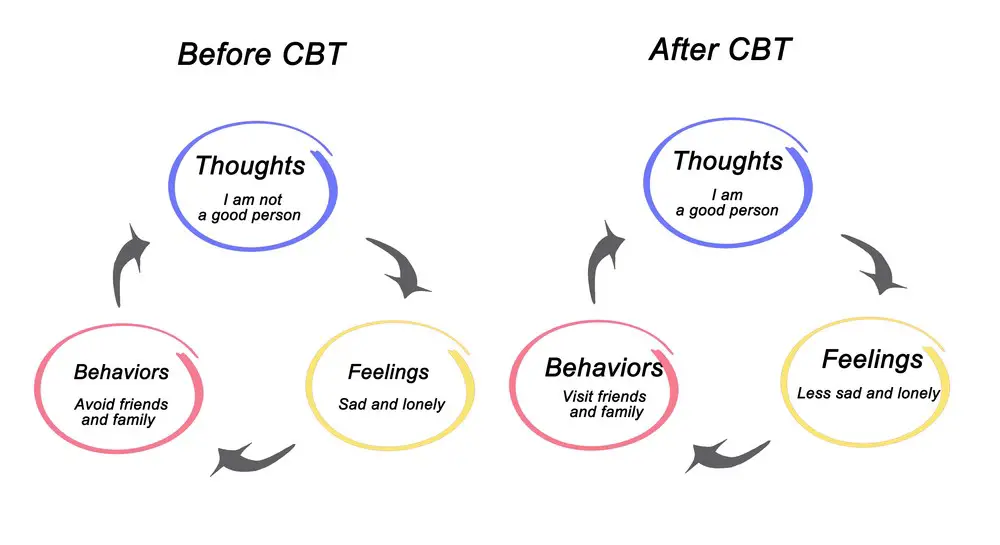 Therapy vs. Medication: Finding What Works for You: Understanding the benefits of treatment and medication can guide you to the support that best aligns with your needs.
Therapy vs. Medication: Finding What Works for You: Understanding the benefits of treatment and medication can guide you to the support that best aligns with your needs.
- Therapy Benefits:
- Long-Term Coping Strategies: Therapy, particularly cognitive-behavioral therapy (CBT), equips you with techniques to manage anxiety triggers and responses, offering lasting benefits.
- Understanding Underlying Causes: It helps unravel the root causes of your anxiety, fostering deeper self-awareness and healing.
- Who Benefits: Therapy is especially beneficial for individuals seeking to understand the emotional and psychological underpinnings of their anxiety and chest pain and those looking for sustainable ways to manage their symptoms.
- Medication Benefits:
- Immediate Symptom Relief: Medication can provide quicker relief from intense symptoms, making it a valuable option for those struggling with severe anxiety.
- Managing Chemical Imbalances: It can help correct chemical imbalances that contribute to anxiety, offering a physiological approach to relief.
- Who Benefits: Medication may be the right choice for individuals experiencing profound, debilitating anxiety that significantly hampers their daily functioning and quality of life, especially when immediate relief is needed.
Embarking on Your Healing Journey:
- Consult a Professional: A mental health professional or general practitioner can help you understand your symptoms, evaluate your situation, and recommend the best course of action, whether therapy, medication, or a combination.
- Consider Your Preferences and Needs: Reflect on your comfort with therapy, your willingness to explore medication, and your symptoms’ severity. Remember, choosing treatment and medication isn’t one-size-fits-all; it’s about what works best for you.
Conclusion: Stepping Forward with Confidence
As you stand at the crossroads of deciding how to address your anxiety-induced chest pain, remember that seeking professional help is a sign of strength, not weakness. Whether through therapy, medication, or both, the path to relief is as unique as you are. By recognizing the signs that it’s time to seek help and understanding the benefits of different treatment options, you’re already taking a brave step towards a healthier, more serene life. Here’s to your journey towards healing and hope, armed with knowledge and courage.
- Breaking the Silence: Why Men’s Mental Health Matters More Than Ever - April 15, 2025
- How to Transform a Home’s Patio Space into a Relaxing Space - March 23, 2025
- 5 Strategies to Use a Cell Phone to Help Manage Your Stress - March 23, 2025
This site contains affiliate links to products. We will receive a commission for purchases made through these links.

